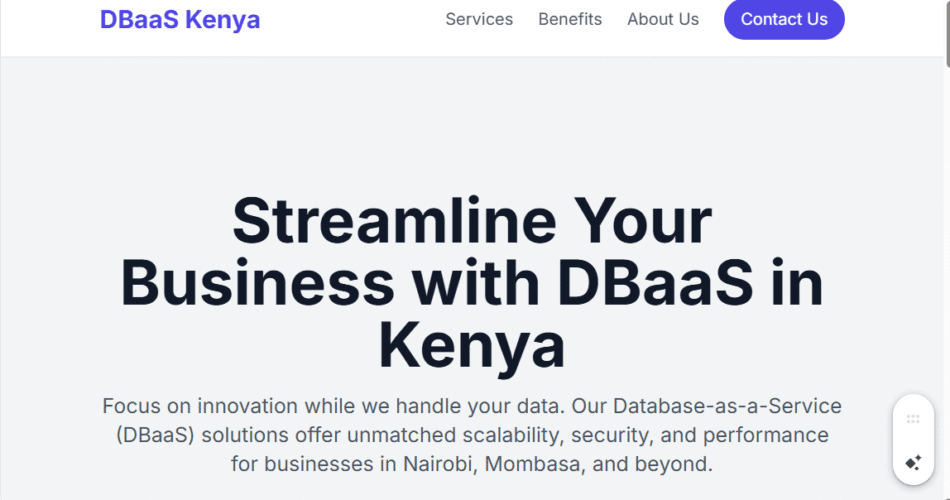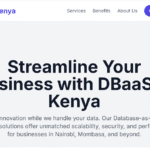Database Management Kenya (DBaaS):
- Delivery Time2 Weeks
- English levelProfessional
- LocationUSA, United Kingdom, United Arab Emirates, New York, Nairobi, Kilimani, Kenya, Dubai, CBD Nairobi, Canada, Australia
Service Description
The cost of Database Management (DBaaS) in kenya is 80000KES per month.Get Database Management (DBaaS) in Kenya at a price of 70000KES per month at Black Shepherd Technologies.
Streamline your operations with Database-as-a-Service (DBaaS) in Kenya. Discover how managed database solutions offer scalability, robust security, and cost-efficiency, freeing your business from the complexities of on-premise infrastructure. We provide comprehensive DBaaS services, ensuring compliance with Kenya’s Data Protection Act, high availability, and expert support. Focus on innovation while we handle your data, from provisioning to disaster recovery. Get a free consultation on how DBaaS can transform your business in Nairobi, Mombasa, and across Kenya.
The digital transformation sweeping across Kenya is driving businesses of all sizes to re-evaluate their IT infrastructure. As data becomes the lifeblood of modern commerce, the need for efficient, scalable, and secure database management has never been more critical. This is where Database-as-a-Service (DBaaS) emerges as a powerful solution, offering a strategic shift from traditional, on-premise database management to a fully managed, cloud-based model. DBaaS in Kenya is more than just a technological trend; it’s a business imperative for companies seeking to enhance agility, reduce operational overhead, and ensure compliance in a rapidly evolving market.
What is DBaaS?
DBaaS is a cloud computing service that provides businesses with access to a fully managed database. Instead of investing in expensive hardware, software licenses, and dedicated IT staff to maintain a database, companies can subscribe to a DBaaS provider. The provider takes on the responsibility for all the backend operations, including hardware provisioning, software installation, patching, backups, security, and performance monitoring. This model allows businesses to consume database services on a flexible, “pay-as-you-go” basis, much like a utility.
The Benefits of DBaaS for Kenyan Businesses
For Kenyan enterprises, both established and startups, the benefits of adopting a DBaaS model are substantial:
Cost-Efficiency and Scalability: Traditional database management requires significant capital expenditure on servers, storage, and software. DBaaS eliminates these upfront costs, replacing them with predictable operational expenses. The cloud-native nature of DBaaS allows for instant scalability, enabling businesses to effortlessly adjust their resources up or down to meet fluctuating demand without over-provisioning. This is particularly advantageous in Kenya’s dynamic market, where business growth can be rapid and unpredictable.
Enhanced Security and Compliance: Data security is a major concern for businesses in Kenya, especially with the strict requirements of the Data Protection Act, 2019. DBaaS providers offer robust security features, including data encryption, access controls, and regular security audits, often exceeding the capabilities of in-house IT teams. Furthermore, many providers offer services that are pre-configured to help businesses comply with local regulations, including data residency requirements and breach notification protocols.
Increased Agility and Focus on Core Business: Managing databases is a complex and time-consuming task. By offloading these responsibilities to a DBaaS provider, a business’s IT team can shift its focus from maintenance and troubleshooting to strategic initiatives like application development, data analytics, and innovation. This increased agility allows companies to bring new products and services to market faster, gaining a competitive edge.
High Availability and Disaster Recovery: DBaaS solutions are built on highly resilient cloud infrastructure, offering built-in redundancy and automated failover capabilities. This ensures high availability, minimizing the risk of downtime that can cripple business operations. Moreover, providers typically offer automated backups and streamlined disaster recovery plans, ensuring business continuity in the event of a catastrophic failure or cyber-attack.
Access to Expert Support: A key value proposition of DBaaS is access to a team of experienced database administrators (DBAs) and support engineers. This expert knowledge is often prohibitively expensive for most small and medium-sized enterprises (SMEs) to hire in-house. With DBaaS, businesses can leverage this expertise 24/7, ensuring that any issues are resolved quickly and efficiently.
DBaaS in the Context of Kenya’s Data Protection Act, 2019
Kenya’s Data Protection Act (DPA) sets a high standard for how personal data must be collected, processed, and stored. For any organization operating in Kenya, compliance is not optional. DBaaS providers play a crucial role in helping businesses meet these legal obligations. Key considerations include:
Data Residency: The DPA includes provisions regarding the transfer of personal data outside of Kenya. A reputable DBaaS provider will offer data centers within the country or provide clear, verifiable information on their data transfer policies and the safeguards in place to ensure compliance.
Data Minimization and Storage Limitation: The DPA mandates that personal data should be stored no longer than is necessary. A well-managed DBaaS platform can help businesses implement policies and automate processes to ensure data is deleted in line with these principles.
Security and Integrity: The DPA requires data controllers and processors to implement “appropriate technical and organizational measures” to protect personal data. DBaaS providers with certifications and established security frameworks can demonstrate compliance with these requirements, giving businesses confidence in the integrity and confidentiality of their data.
Choosing the Right DBaaS Provider in Kenya
As the Kenyan cloud market continues to grow (projected to reach over $1 billion by 2032), the number of DBaaS providers is also increasing. When selecting a provider, businesses should consider:
Supported Databases: Ensure the provider supports the database engines you need, whether it’s a traditional relational database like MySQL or PostgreSQL, or a NoSQL database like MongoDB.
Performance and Scalability: Evaluate the provider’s infrastructure and its ability to deliver the performance and scalability your applications require.
Security and Compliance: Thoroughly vet the provider’s security practices and their ability to help you meet the specific requirements of the Kenyan DPA.
Pricing Model: Understand the pricing structure. A “pay-as-you-go” model offers flexibility, but it’s important to analyze the total cost of ownership to avoid hidden fees.
Support and Service Level Agreements (SLAs): A reliable provider should offer comprehensive support and a clear SLA that guarantees uptime and performance.
In conclusion, DBaaS is a transformative technology that is perfectly suited for the modern Kenyan business landscape. By embracing managed database services, companies can unlock new levels of efficiency, security, and innovation, positioning themselves for sustainable growth in an increasingly data-driven economy.








